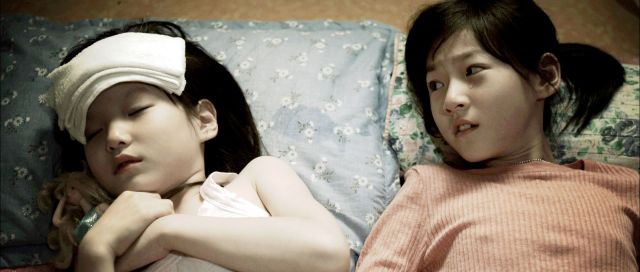"Barbie"

It's difficult to frame the issues involved with international adoption without offending someone- I would imagine that any adopters of Korean children would be grossly offended by the portrait shown of the industry in this film. But then, that's the dirty little secret. It is in large part an industry, tied heavily to market incentives and engrossed in the world economy.
This is made all too clear from the beginning where we see that little girl Soon-Ja (played byKim Ah-ron) has a deeply unsettling obsession with all things American. In a ramshackle house, where she lives with her older sister and mentally retarded father, chronically ill Soon-Ja would seem to be the ideal choice for a better life in the United States. And yet her motivation is just plain creepy- it's hard to come up with any defendable reason for why she feels so strongly about wanting to be adopted overseas. While there are good arguments to be made, the only arguments we ever see discussed are loaded with heavy doses of condescension and thinly veiled contempt for the horrible place of Korea.
"Barbie"is based on a story from some thirty years ago. This is obviously not the same Korea that exists today, and yet the fetishization that goes on in this film, along with the very explicit text stating that all things American are innately superior to whatever exists in Korea still has an uncomfortably modern twinge to it. Even thirty years ago such objective pronouncements were of dubious value- goodness knows we in the United States have our own children's hell in the form of the foster care system, and yet it's rare to see anyone discuss that particular problem in the context of cultural superiority.
The main flaw in"Barbie"is that it's story goes a little too far in its allegory. When we find out the reason why this American family wants to adopt a Korean child so badly, the revelation immediately comes off as horribly implausible. Bizarrely, the removal of a single world would have rendered the entire situation still genuine to me- but once that word comes up I immediately had questions about legality and licensing that very much took me out of the film's naturalistic storytelling.
It's not an entirely relevant flaw-"Barbie"as a whole is a film about massive discomfort concerning a situation that would seem morally all right, provided it was described in a dry, legal report, but comes off in a much more unsettling way when put into actual context. It begs the question- why is it that, in terms of legalized adoption, money and paperwork are the most important parts of the process? I mean, I can understand why they have some importance, but when nearly every character in this movie is putting a disproportionate focus on that aspect compared to important stuff like, you know, love...well, it's enough to make a person wonder.
And I think that was probably directorLee Sang-woo-IV's main thought in making this film anyway. It's more interested in asking difficult questions than it is in being politically correct. It's less successful in providing decent answers, though, and it has enough of a clearly defined opinion that I can't discount the authorial agenda entirely. Regardless, this is a film worth watching.
Review by William Schwartz
"Barbie"is directed byLee Sang-woo-IVand featuresLee Cheon-hee,Kim Sae-ronandKim Ah-ron.
